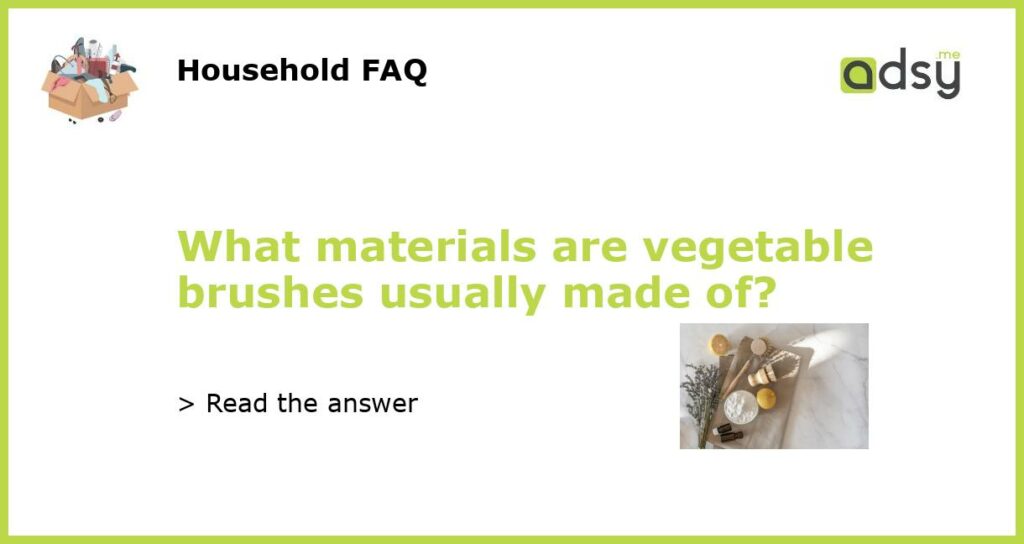Natural Materials used in Vegetable Brushes
Vegetable brushes are commonly made from a variety of natural materials. One of the most common materials used is tampico fiber, which is derived from a type of cactus that is native to Mexico. Tampico fiber is a natural bristle material that is strong, durable, and resistant to water and chemicals. This makes it ideal for use in vegetable brushes, as it can effectively scrub away dirt and debris from the surface of vegetables.
Another natural material commonly used in vegetable brushes is coconut fiber, also known as coir. Coconut fiber is derived from the outer husk of coconuts and is known for its strong and abrasive qualities. It is often used in combination with tampico fiber to create a brush that can effectively remove tough dirt and residue from vegetables.
Some vegetable brushes are also made from natural bristle materials such as horsehair or boar bristle. These materials are soft and gentle on delicate vegetables, making them ideal for cleaning produce like mushrooms or lettuce. However, they may not be as effective at removing stubborn dirt and debris compared to tampico or coconut fiber.
Synthetic Materials used in Vegetable Brushes
In addition to natural materials, vegetable brushes can also be made from synthetic materials. One commonly used synthetic material is nylon bristles. Nylon bristles are known for their durability and resistance to water and chemicals. They can effectively clean vegetables without scratching or damaging their surfaces.
Another synthetic material used in vegetable brushes is silicone. Silicone bristles are soft and flexible, making them suitable for cleaning delicate vegetables. They are also easy to clean and resistant to bacteria and mold growth.
Some vegetable brushes may combine both natural and synthetic materials. For example, a brush may have a wooden or bamboo handle with bristles made from a combination of tampico fiber and nylon. This combination allows for effective cleaning while also providing a comfortable grip for the user.
Eco-Friendly Materials used in Vegetable Brushes
With the growing concern for environmental sustainability, there has been an increase in the use of eco-friendly materials in vegetable brushes. Some eco-friendly options include brushes made from sustainable bamboo or recycled plastic.
Bamboo is a fast-growing plant that does not require pesticides or fertilizers, making it a more sustainable alternative to hardwood. It is also biodegradable and can be composted at the end of its life cycle.
Recycled plastic brushes are made from post-consumer recycled plastic, such as plastic bottles or containers. By using recycled materials, these brushes help to reduce the amount of waste going to landfill and conserve valuable resources.
Other Considerations in Vegetable Brush Materials
In addition to the type of material used in vegetable brushes, there are other factors to consider when choosing a brush. One important consideration is the shape and size of the brush. Vegetable brushes come in various shapes and sizes, including handheld brushes and brushes with long handles. The shape and size of the brush should be chosen based on the type of vegetables you commonly clean and your personal preference.
Another consideration is the bristle stiffness. Some brushes have stiff bristles that are more suitable for scrubbing tougher vegetables, while others have softer bristles that are better for delicate vegetables. It is important to choose a brush with bristles that match the cleaning needs of the vegetables you frequently use.
Lastly, it is worth considering the overall durability and quality of the brush. A high-quality brush made from durable materials will last longer and provide better cleaning performance compared to a lower-quality brush. It may be worth investing in a higher-quality brush that will save you money in the long run.
Conclusion
Vegetable brushes can be made from a variety of natural and synthetic materials. Natural materials like tampico fiber, coconut fiber, and horsehair are commonly used for their cleaning and gentle qualities. Synthetic materials such as nylon and silicone offer durability and resistance to water and chemicals.
As eco-friendly options gain popularity, vegetable brushes made from sustainable bamboo or recycled plastic are also available. When choosing a brush, consider factors like shape, size, bristle stiffness, and overall durability to ensure you select the right brush for your cleaning needs. By using a vegetable brush made from high-quality and suitable materials, you can effectively clean your produce and maintain good kitchen hygiene.






